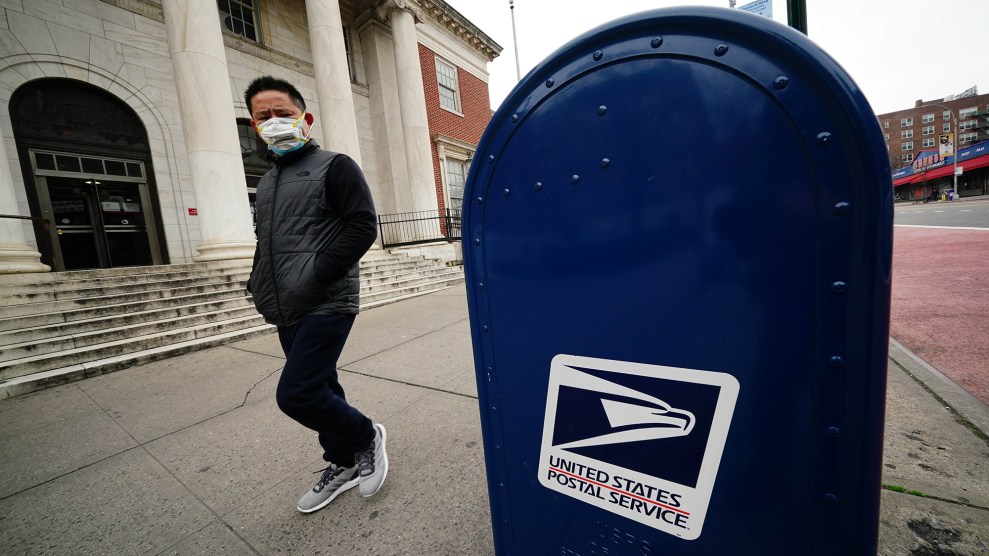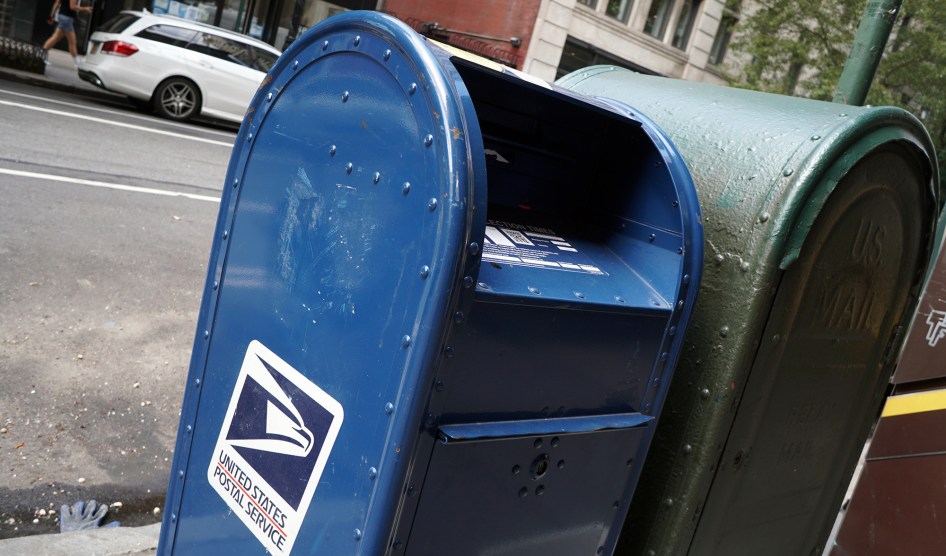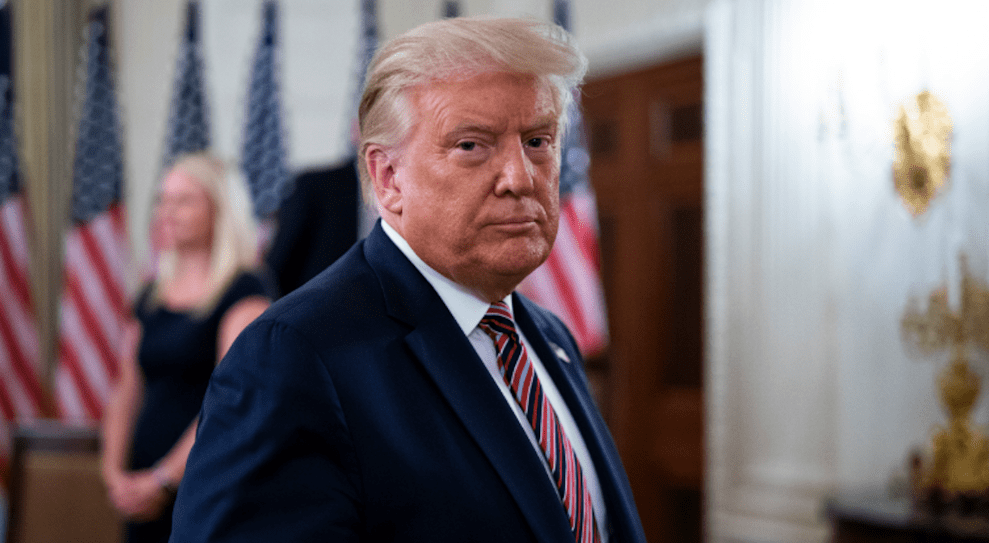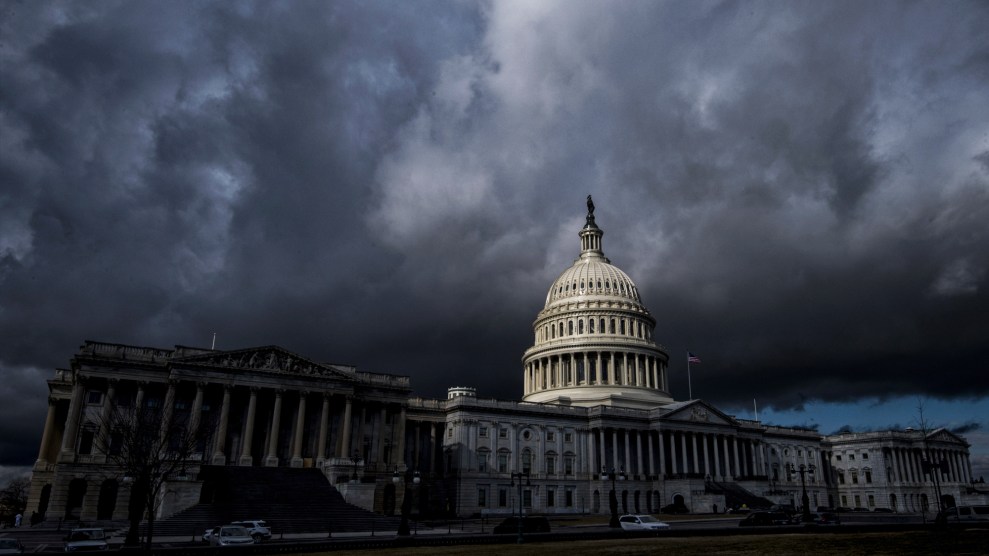
John Nacion/NurPhoto via ZUMA Press
While President Donald Trump forthrightly acknowledged only yesterday that weakening the Post Office will help him obstruct mail balloting this fall, postal workers in the key swing state of Michigan say his mission has been clear for weeks.
Delayed mail, a consequence of battles over funding for the United States Postal Service and of the agency’s staffing shortages, affects many aspects of American life—the delivery of millions of prescriptions, paychecks, bills. But recent funding cuts, overtime reductions, and other changes imposed by Louis DeJoy, the person Trump recently appointed as head of the Postal Service, have left postal workers warning about new multi-day delays—and that a deliberate effort to slow down the mail and interfere with the election is underway.
“I think it’s absolutely true,” said Steve Wood, a mail clerk who works at the Michigan Metroplex, a massive mail sorting center near Detroit. He says he was convinced in recent weeks as he and his colleagues saw the removal of almost a quarter of the facility’s mail sorting machines, a lack of substitute employees to replace workers missing due to the COVID-19 pandemic, and a general lack of urgency to locate and send along ballots that have piled up in bins.
“For years, every time there’s an election, we spend an enormous amount of time searching through [mail containers] to make sure that we get every ballot,” he says. While Michigan has held two major elections since April, he says “it doesn’t appear that this year that they were real worried about that.”
Roscoe Woods, president of American Postal Workers Union Local 480-481 in the Detroit-metro area, said he didn’t initially think the policy changes were about the election. But after what he’s seen and heard from his members, he says he’s now “a firm believer that it’s a fundamental effort to undermine people’s confidence in this agency and make it harder to vote by mail…There’s no other explanation.”
Michael Mize, the president of the Michigan Postal Workers Union and of its Flint area local, thinks the changes “absolutely” could be part of a vote-suppression effort, but finds the possibility too disturbing. “I don’t want to say it, to be very honest, because I don’t want that to happen or be any truth behind it,” he said, adding that even the appearance of delays affecting ballots would be enough to give people “reason to challenge whether or not things were handled appropriately.”
Reports about the slowing of mail delivery and its potential to disenfranchise voters are surfacing across the country. But the issue is particularly acute in Michigan, a perennial battleground state where Trump topped Hillary Clinton by roughly 10,000 votes in 2016—just barely more than a tenth of a percentage of the 4.5 million votes cast.
DeJoy, a Trump mega donor who made millions in private shipping and whose continued financial entanglements with the industry have raised concerns about conflicts of interest, was appointed by the president as postmaster general on June 15. He has defended his recent policy changes and decisions, including the reducing workers’ overtime and haggling over rates charged to governments to mail ballots, as being justified by bottom line concerns, citing the USPS’s longstanding funding and staffing issues.
On August 7 DeJoy, in his first remarks to the Postal Service Board of Governors, said the notion that he would “ever make decisions concerning the Postal Service at the direction of the President…is wholly off-base.” Contrary to Trump’s claims that the Postal Service “can’t handle” mail ballots in the fall, DeJoy insisted the agency “has ample capacity to deliver all election mail securely and on-time.” He also denied that he’s working to privatize the Postal Service—a longstanding goal of conservatives, and a step deeply opposed by the USPS’s unionized workforce.
DeJoy’s actions have caught the attention of Congress, where Democrats see his changes as part of an obvious and open plan by Trump to hamstring mail voting and suppress votes. On Wednesday, Rep. Carolyn Maloney (D-N.Y.), chairwoman of the House Committee on Oversight and Reform, introduced a bill that would block the Postal Service from implementing any further operational changes until the pandemic is over. The same day, every Democratic senator signed a letter to DeJoy demanding he answer questions about about increased postage charges for mail ballots and hand over his correspondence with local election officials on the issue. The actions follow an earlier request from Sen. Elizabeth Warren (D-Mass.) and several other congressional Democrats that the US Postal Service’s inspector general investigate whether DeJoy’s actions have slowed down the mail. The IG’s office declined to comment on “any ongoing work.”
Michigan Sen. Gary Peters, a Democrat, has launched his own investigation. As the ranking member on the Senate’s Homeland Security and Governmental Affairs Committee, Peters has been gathering information from postal workers and others across Michigan, alongside reports from colleagues on both sides of the aisle about Postal Service issues in their states.
Peters’ office has set up a website to collect complaints from Michiganders about what they’re seeing. So far more than 6,000 people have sent messages about mail delivery problems, including one person who told the senator that delays had kept them from taking medications on time. While Peters says his office is used to fielding complaints about the mail, a “surge” of complaints started up around mid-July. “Something is definitely up over the last few weeks,” Peters says.
Peters, speaking on Tuesday, said he is still gathering information and he hasn’t yet reached a conclusion about whether these policies are aimed at disrupting the election. But he said he’s troubled by what he’s learned about policy changes that cut overtime, new procedures that limit the time automated mail sorters run, and modifications to the operations of inter-facility mail trucks.
Peters says he’s also concerned by conflicting answers he’s received from DeJoy’s office about the changes. In July, the senator asked about published reports of decreased overtime and delivery standards across the nation. The Postal Service responded in writing, insisting the policies were local and the media reports were incorrect. A few weeks later, after DeJoy had a testy meeting with Sen. Chuck Schumer (D-N.Y.) and House Speaker Nancy Pelosi, the USPS confirmed that the policies were, in fact, real, and they were national. Peters said the USPS hasn’t provided any data indicating the new policies are worthwhile, and refuses to indicate if DeJoy will reverse course if it’s clear that the policies are leading to delayed mail. Postal workers across the country have told Peters they already are.
“Did you actually research whether or not these policies would lead to greater efficiency?” Peters said, recalling a question he’s asked DeJoy’s office. “And if not, why? That’s really disturbing that we’re in the middle of a pandemic and you’re making major changes in policies without knowing what the impact would be.”
While the COVID-19 pandemic is expected to lead to record-high rates of postal balloting across the country, Michigan was on track for a major expansion before the virus appeared. In 2018, the state’s voters approved a change to election law allowing anyone to vote by mail. The state’s primary earlier this month saw roughly 65 percent of the 2.5 million ballots cast by mail.
But this month’s election showed that Michigan post offices, straining under existing burdens and DeJoy’s new mandates, can’t always deliver properly mailed ballots quickly enough to be counted. In Sterling Heights, a large suburb north of Detroit, 165 mail ballots postmarked on July 30 arrived six days after the August 4 election. Though a local race was decided by just 87 votes, the ballots could not be counted under a Michigan law requiring they arrive at local election offices or be in drop boxes by 8 pm on Election Day.
Melanie Ryska, Sterling Heights’ city clerk, told Crain’s Detroit Business that a few late ballots are normal for such an election, but the number they received this month “is very unusual,” even after the city advised voters to use drop-boxes in order to “avoid the mail altogether just in case something like this happened.”
Tracy Wimmer, a spokesperson for Michigan Secretary of State Jocelyn Benson, says the state has been collaborating with the post office and working “to ensure that election mailings are prioritized.” Benson has confirmed that more than 6,000 ballots cast in August’s primary were rejected for falling afoul of the same arrival deadline law, which she’s called to be changed before it can cause “the disenfranchisement of tens of thousands” of the roughly 2.4 million Michigan voters already set to receive mail ballots for November.
The more mail is subject to delays, in Michigan and elsewhere, the greater the risk postal voters will see properly mailed votes go uncounted due to similar laws. The Washington Post has reported that Michigan USPS facilities have seen their ability to process mail reduced by 700,000 pieces per hour. One recent morning Wood said he and others at working at the Metroplex counted 400 all-purpose containers holding undelivered mail due to short staffing and other recent changes.
“That’s never—even during Christmas, when the Postal Service deals with 1.2 billion Christmas cards—we never had 400 containers of mail on the workroom floor,” he says. The coronavirus, which has killed several postal workers in Michigan, has brought “never-ending” turmoil, Wood says, which has only been exacerbated by changes cutting overtime, temporary employees, and access to mail sorting machines.
“DeJoy comes on the scene and it’s just feeding the chaos,” Woods says. “To do this in the middle of a pandemic when we’re short?”
Other postal workers in Michigan confirm they feel targeted by the administration and the new USPS leadership. To Mize, the head of the Michigan Postal Workers Union, Trump’s comments disparaging “mail-in voting [like it] would create more fraudulent votes” are part of an “attack to discredit us with the American people.” As far as DeJoy’s policy changes, he considers that “an attack from within,” and “a deliberate slowdown of the mail” that he views “as a crime.”
Mize says offices with workers he represents have mandated mail that used to be machine sorted now be sorted by hand, and have changed when it happens in a way that workers say is leading to cascading, multiple day delays. “The fact that we would have somebody come in and internally, purposely slow that down and make us look bad to the American public, it makes me sick to my stomach,” Mize says.
Woods, the Detroit-area worker and union official, seemed to get more upset about the situation the more he talked. “The idea that you would destroy a centuries-old institution that continuously has approval ratings in the 90s to rig an election or make it harder for people to vote, to me, is just, it’s criminal man. It’s criminal that you would deny people their medications, you would deny kids their birthday cards. Millions of Americans use the mail.”
“You’re watching voter suppression on a full-blown national level,” he said. “It’s so disheartening to me. I’m a veteran and I love this country. And it happened so fast.”















